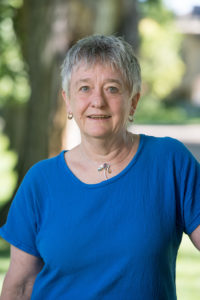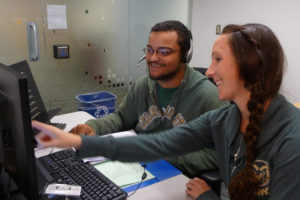
The Department of Occupational Therapy at Colorado State University has been ranked a top-ten program in the nation by U.S. News and World Report for decades. Currently ranked 7th, the program trains students to become occupational therapists, helping people experiencing challenging situations, such as illness, injury, developmental delay, or homelessness, to optimize their participation in everyday life.
Until recently, to become an occupational therapist, CSU students pursued an entry-level master’s degree. But starting in May 2022, the professional Occupational Therapy Doctorate program (OTD), will replace the master’s program for all incoming students. The Department will continue to offer a Ph.D. in Occupation and Rehabilitation Science for students who want to pursue a career in research and teaching.
Learn more about the new OTD program in the Q & A below with Department Head Anita Bundy.
What motivated the transition from an OT master’s program to a professional doctorate program?

Several years ago, the professional association began talking about setting the professional doctorate as the point of entry to the profession. In fact, they initially planned to mandate the OTD as the entry point—as physical therapy has done. After a time, they rescinded that mandate, resulting in dual entry to the profession (masters and doctorate). Nonetheless, many OT schools saw the need and wisdom and began moving to the OTD. anyway. CSU is a highly respected, top-ranked program. Further, OT is a complex profession. Helping people to gain or regain a meaningful, satisfying everyday life in the face of significant challenges is complicated and requires substantial education. Consequently, the CSU-OT faculty felt a responsibility to move to the OTD.
What process did you undertake to develop the new OTD?
The entire faculty spent more than a year working in small and large groups to create the essence of the program and then to develop courses. We went through the CSU process and the accrediting body process. In preparation for the first class, we continue to refine the syllabi and to meet together in clusters. We are also seeking advice from our external advisory committee on the characteristics they want to see in our graduates as OT professionals—the “soft” characteristics as well as the hard skills.
How is the new OTD different from the master’s program that preceded it?

The most obvious change is that the OTD is a three-year program. In large part, the final year comprises an in-depth, capstone experience in an area that each student chooses and that they plan throughout the first two years. But the capstone is not the only difference from the masters. The in-depth development process in which we engaged allowed us to change many things about content and how the courses will be delivered—to make sure we remain a cutting-edge, state-of-the-art program.
What are the differences between the OTD program and the Ph.D. Occupation and Rehabilitation Science? What type of student would be attracted to each one?
The requirements for completing the two programs are very different, as are the purposes. The OTD is a professional degree; graduates will be prepared to practice as entry-level occupational therapists. The Ph.D. is an interdisciplinary research degree; most, but not all, of our students are occupational therapists. We’ve also had Ph.D. students who were music therapists or health and exercise scientists, for example. It’s important to note, though, that those who are not occupational therapists when they enter do not become OTs in the Ph.D. program. Ph.D. graduates will go on to research or academic careers.
To learn more about both the Occupational Therapy Doctorate and the Ph.D. in Occupation and Rehabilitation Science, see the CSU Department of Occupational Therapy website.
The Department of Occupational Therapy is part of CSU’s College of Health and Human Sciences.